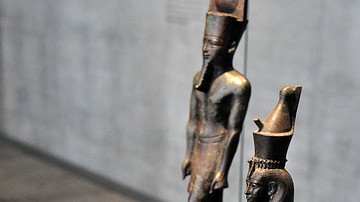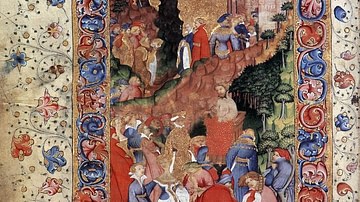Review

| Rating: | |
|---|---|
| Title: | A Noble Ruin: Mark Antony, Civil War, and the Collapse of the Roman Republic |
| Author: | W. Jeffrey Tatum |
| Audience: | General Public |
| Difficulty: | Hard |
| Publisher: | Oxford University Press Inc |
| Published: | 2024 |
| Pages: | 496 |
"A Noble Ruin" provides a new perspective on Mark Antony and the fall of the Roman Republic, capitalizing on new evidence and a better understanding of the ancient sources, which were often unfavorable to Antony during and after his life. Best read by those with a strong background in the Roman Republic, this book presents a nuanced portrait of Mark Antony as a man equally capable of great statesmanship, military valor, and ruinous overconfidence.
Despite Tatum's best efforts, it is hard to call this book a proper biography of Mark Antony. As the subtitle suggests, Tatum attempts to chronicle Mark Antony’s life, the multiple civil wars throughout it, and the broader narrative of the collapse of the Republic. Any one of those topics is worthy of its own book. At times, Tatum’s argument about Antony is lost amidst these competing priorities. Antony does not come into focus as the main character until almost halfway through the book. At that point, it is hard to understand Antony as anything other than a two-dimensional figure in the shadow of Julius Caesar. After Caesar’s death, both in real life and in the book, Antony comes into his own as a political powerhouse in the Republic, and Tatum’s re-evaluation of the ancient sources starts to show its value.
Tatum spends much of the book dealing with ancient sources, such as Cicero and Plutarch, who are almost universally hostile to Antony, and how they have skewed the narrative. His masterful reconsideration of the many allegations laid at Antony’s feet demonstrates the flaws in prior narratives about him. Far from being a wildly corrupt tyrant who sought to bring ruin to the Republic with his foreign lover and queen, Cleopatra, Antony's behaviors and choices must be seen within the context of the norms established for similar Roman elite men at the time. Tatum points out that, as the conflict between him and Octavian (later the emperor Augustus) escalated, both men increasingly acted outside those norms. That the ancient sources condemned Antony for his behavior but not Octavian was a product of the eventual outcome of the conflict; as the saying goes, history is written by the victors.
Far from being an uncritical defender of Antony, Tatum offers a nuanced perspective on his life, ambitions, and political actions. He often deviates from the typical narrative, even in the most recognizable moments like Antony's affair with Cleopatra, who is seen in the ancient sources as a corrupting influence for Antony and a danger to the Roman people. Tatum reframes her role in the narrative as political, where she uses Antony to strengthen her position just as much as he uses her for the same reason, which is a welcome departure from Cleopatra’s typical portrayal as lustful and ruinous in her femininity. These are the moments when Tatum's argument truly shines.
Tatum’s prose can be difficult to follow in several places, and almost all of the maps Tatum employs are captioned incorrectly (a map of Italy is labeled “Ptolemaic Alexandria,” for example). Although these are relatively minor editorial and stylistic errors, they do detract from the quality of the book and undermine Tatum’s professed goal that this book be accessible to any reader. Overall, though, Tatum offers a wealth of evidence on how the Roman Republic ended, and the specific choices, mistakes, and triumphs of the many people beyond just Antony that contributed. Anyone interested in learning more about Antony and his oft-sensationalized role in the end of the Republic will find value in this book.
About the Reviewer
Cite This Work
APA Style
Hagler, A. (2024, January 25). A Noble Ruin: Mark Antony, Civil War, and the Collapse of the Roman Republic. World History Encyclopedia. Retrieved from https://www.worldhistory.org/review/392/a-noble-ruin-mark-antony-civil-war-and-the-collaps/
Chicago Style
Hagler, Alex. "A Noble Ruin: Mark Antony, Civil War, and the Collapse of the Roman Republic." World History Encyclopedia. Last modified January 25, 2024. https://www.worldhistory.org/review/392/a-noble-ruin-mark-antony-civil-war-and-the-collaps/.
MLA Style
Hagler, Alex. "A Noble Ruin: Mark Antony, Civil War, and the Collapse of the Roman Republic." World History Encyclopedia. World History Encyclopedia, 25 Jan 2024, https://www.worldhistory.org/review/392/a-noble-ruin-mark-antony-civil-war-and-the-collaps/. Web. 26 Apr 2025.




